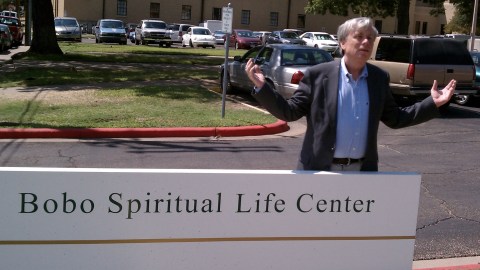Bourgeois Bohemians (Bobos) and ME

So here’s the advice of the maverick philosopher:
The solid bourgeois may dismiss as so much nonsense philosophy, poetry, and other products of questers and romantics—all the while subscribing to the socially sanctioned nonsense of some respectable established church.
Be neither bourgeois nor bohemian, the one to the exclusion of the other. The true maverick is that dialectical blend, the sublatedness (Aufgehobensein) of both, that blend known as the BoBo, the bourgeois bohemian.
The phrase “bourgeois bohemian” (or Bobo) was invented and/or popularized David Brooks’ in his best effort at fairly profound pop sociology—Bobos in Paradise.
It used to be that the situation in our country was tragic. We were divided between those who were solidly bourgeois—those with the talent and discipline to make money—and the bohemians—those who know how to spend money on enjoying life in the most humanly worthy and liberated ways and so had no time or inclination to make money. Those who had the money didn’t know how to use it. Those who knew what to do with it didn’t have it.
The spirit of the 1950s, which was all about being responsible and respectable—but also BORING and enslaved to the other-directed and ridiculous conventions of the establishment. To be bourgeois, is to be totally inauthentic (man). Whenever the bourgeois guy thinks of himself, he thinks of others. He wants to use them—for example, network with them—to satisfy his selfish desires. And when he thinks of himself, he thinks of others. He dresses for success; he’s obsessed about how he appears to others. If he showed them his “true self,” they would know that he out to exploit them. The effective exploiter never shows himself as an exploiter, as Machiavelli said.
The bohemian may be authentic, but he’s irresponsible. We see on Broadway that the someone who revels in LA VIE BOHEME can’t even pay the rent. Well, that’s because that guy won’t just get a job, do what’s required to pay the rent. The best American bohemians were the HOWLING beatniks of the 1950s out on the road with Kerouac, Moriarity, and the other guys. (My favorite was actually the gentle Maynard G. Krebs of the classic TV show DOBIE GILLIS, whose constant exclamation was something like “What! Me work?”)
But being bohemian became popular and respectable as a result of the “Do your own thing” spirit of the 1960s. The sons and daughters of the solid citizens of the 1950s weren’t about money; after all, they had their parents’. That rather large counterculture of peace, love, and all that wasn’t about work. It was about poetry, something like philosophy, and related forms of romantic self-expression. For a while, every smart and ambitious young man and woman became a musician (and that why it’s just impossible to beat the “alternative” music of the late 1960s).
The philosopher of the counterculture was one Herbert Marcuse. He taught that capitalism had conquered scarcity. Scarcity now conquered, we could now all be about “the art of life.” Marx’s end of history was here!
That turns out not to be true; scarcity doesn’t stay conquered unless we keep up our hard work.
And so now we have bourgeois bohemians: What the maverick philosopher celebrates is a guy who has enough of the bourgeois virtues—such as industriousness, and reliability—to get rich. But he uses the free time he buys to be all bohemian or about art, music, poetry and the other components on the liberated art of living. So many libertarian readers of BIG THINK proudly claim to be the perfect combination of responsible productivity (the spirt of the 1950s, 1980s, and 1990s) and personal and edifying self expression (the spirit of the 1960s).
The bourgoeis bohemian, it’s claimed, is the synthesis of opposites that overcame what used to our national tragedy.
There’s a lot more to say. But for now: Reflect on the question of the bourgeois bohemian as “role model” synthesis.
Well, one more thing. Brooks explained that Bobo spirituality is undemanding, New Agey, just kind of vague, a lullaby of comfort and easygoing edification. So the opposite of Bobo spirituality might be Baptist spirituality—what with its very personal and judgmental God with commandments and such.
But when I was at Baylor University—an excellent Baptist institution—I actually came upon the Bobo Spiritual Life Center. Don’t get too excited. It was named after some guy named Bobo, who probably isn’t or wasn’t some bourgeois bohemian. Maybe the point of this post is to get the attached picture of ME out there for your enjoyment.





